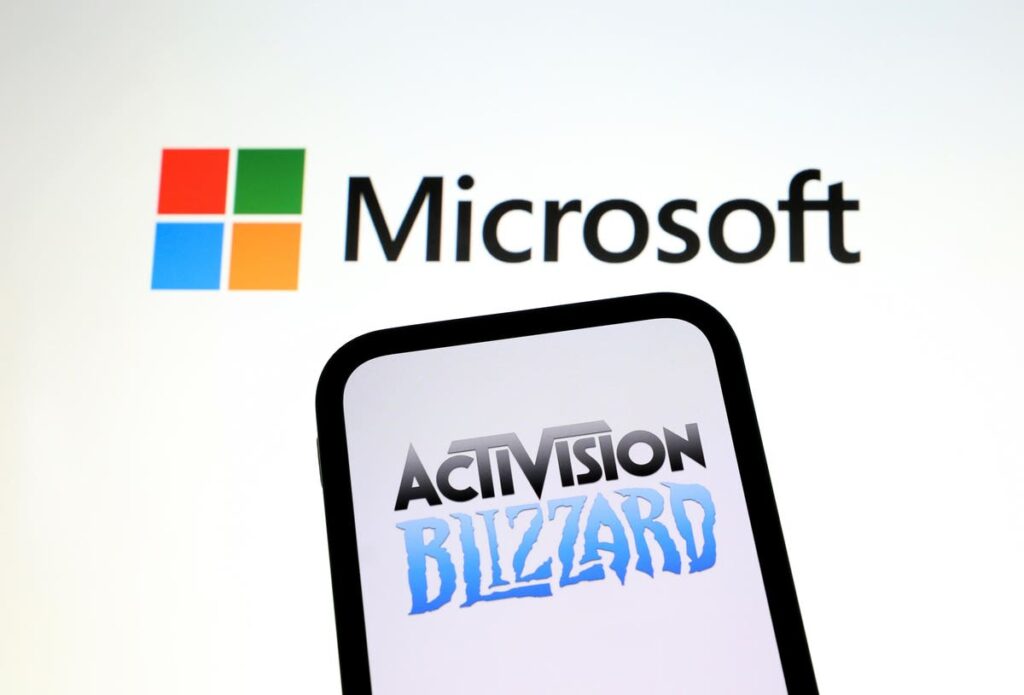Key takeaways
- Microsoft’s Activision takeover faces regulatory hurdles from the UK, US and even gamers in a private lawsuit
- UK and US hearings are set to take place in the summer, with 40 other countries, including the EU having already approved the merger
- Activision’s share price has swung with the headwinds and is now sitting at $80 a share when Microsoft had agreed to buy it for $95 a share
Big Tech has had its fun and now it faces increasing regulatory scrutiny. That’s certainly the case with Microsoft’s proposed mega-merger with gaming company Activision Blizzard, which at $75 billion, would be the biggest gaming takeover in history. So far the UK and US have held firm with their complaints, leaving Microsoft’s army of lawyers to battle it out in the courts over the summer.
The merger is delayed indefinitely and may even be canceled if it can’t convince the US and UK that the deal is competitive enough. Can Microsoft risk abandoning these two key markets to keep the deal intact? Let’s get into the details.
While the Microsoft and Activision merger moves at a snail’s pace, the broader tech industry is speeding ahead – and Wall Street is loving it. Now you can use AI to help you invest in the frenetic market with Q.ai’s Emerging Tech Kit, which invests in a basket of tech stocks and ETFs.
Each week the AI algorithm does the heavy lifting with the data, assessing which assets are set to perform well. It then reallocates your investment in the holdings as required, helping you to build wealth without the upfront work.
Download Q.ai today for access to AI-powered investment strategies.
What is the Microsoft and Activision proposed deal?
In January 2022, Microsoft first announced it would buy gaming company Activision Blizzard, which owns wildly successful game franchises like Call of Duty, Candy Crush and World of Warcraft, for a huge sum. Microsoft is looking to persuade regulators with some concessions, such as offering 10-year licensing agreements for rival platforms – something Activision doesn’t offer itself at the moment.
The merger would be the biggest of its kind in history, with a hefty $75 billion price tag. As a result, it’s drawn even more scrutiny than any other merger – and not everyone has liked what Microsoft is proposing.
What’s the beef between Microsoft and the UK?
In a possible bid to make an impact on the regulatory world stage after Brexit, the UK decided to block the deal in April. The UK’s Competition and Markets Authority (CMA) argued that Microsoft had cornered roughly 70% of the cloud gaming market already, and taking on Activision’s popular franchises would give them too much power over the industry.
It’s even taken the merger block a step further and has said it would block Microsoft’s takeover of Activision for the next ten years. At the time, Microsoft president Brad Smith said the move “discourages technology innovation and investment in the United Kingdom” and that the CMA had a “flawed understanding of this market”.
In short, the CMA has taken a long-term view of the merger’s potential impact on the market. There’s a question mark over what would happen after those 10-year licensing deals expire for rivals – but then again, it’s impossible to predict what state the cloud gaming industry will look like in a decade. The UK isn’t taking any chances.
Microsoft, naturally, has appealed the decision. The hearing is set to take place on July 24th. Since then, there’s been chatter that Activision could leave the UK altogether and move to Europe, where the deal has been greenlit, in a bid to fix the issue.
How did other countries handle the merger proposal?
40 other countries have approved Microsoft’s proposed takeover of Activision. In May, the EU approved the deal, with the European Commission saying the deal was competitive because Microsoft planned to license Activision’s games to rival game platforms. The move was also considered to be a jab at the UK’s decision, as more companies look to move away from the UK and establish European bases after Brexit.
China also gave the merger the thumbs up last week, with the Chinese State Administration for Market Regulation (SAMR) approving the deal unconditionally. Japan, which is home to gaming rival Sony, South Korea and Brazil are other notable markets that have approved the takeover.
Microsoft is likely furious with the CMA’s decision, and to the rest of the world the UK looks like an outlier, but they’re not the only ones that have taken issue with the takeover. The US Federal Trade Commission (FTC) sued Microsoft last year to block the deal, arguing Microsoft has a history of buying valuable games and only offering the content on its own Xbox platform. A hearing on the matter is scheduled for August 2nd.
In a David vs Goliath situation, there’s also a private antitrust lawsuit that’s been brought against Microsoft by individual gamers, who claim the deal should be halted as it drastically affects competition in the market. Microsoft said the gamers’ case contained “unsupported and implausible claims about the deal’s effect on competition”.
The market reaction to the drama
Activision’s stock has dipped and risen with the fallout of different regulatory bodies approving or rejecting the deal. When the EU approved the deal its share price rose 1.3%, but it plunged 11% when the CMA ruling was released. Overall the stock is up 4.71% since the start of the year at $80.5, which is well under the $95 a share Microsoft had agreed to pay when the purchase was first announced.
Microsoft hasn’t seen much effect on its share price, buoyed this year by the AI revolution and its early adoption of AI chatbots. For now, it’s enjoying a 40% increase in its share price in 2023 and hasn’t seen much effect on the stock despite the uncertainty around the merger.
That could change in the summer months once we hear more from the UK and the US on why it’s blocked the deal. Should the merger not advance, Activision could see its share price plunge as the company’s future had been entirely linked to the Microsoft takeover. Even if it does go ahead, it may not be in its current form, which could further send Activision shares tanking and leaving Microsoft with an overpriced asset.
The bottom line
Microsoft and Activision aren’t set for an easy summer as they battle the CMA and the FTC on whether the merger is anti-competitive or not. It’ll be popcorn-ready viewing for spectators and investors, who will be keen to see the outcome of a single country blocking such a high-value deal.
The risk is the deal doesn’t go ahead at all, which could send both companies’ share price spiraling and send a clear message to other Big Tech companies considering mega-mergers. The CMA has a strong history of winning appeals, so investors will watch keenly to see if anything changes.
The takeover has involved regulatory bodies worldwide to either approve or reject the deal. You can invest in global markets with the help of a handy AI algorithm, thanks to Q.ai’s low-risk Global Trends Kit.
The AI checks the data to see which stocks, bonds, commodities, and forex are top weekly performers. The AI then switches up the holdings as needed to help you stay one step ahead while growing your portfolio. It’s your AI-powered investing tool designed to help make life easier.
Download Q.ai today for access to AI-powered investment strategies.
Read the full article here













